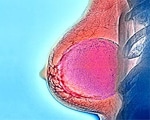Women whose breasts become tender after taking hormone replacement therapy are nearly twice at risk of developing breast cancer than women whose breasts do not become tender on the drugs.

Breast tenderness may be a way to identify women who have a higher risk of developing breast cancer while taking hormone replacement therapy to treat menopause. More than 400,000 women die from breast cancer globally each year. About 75 percent of breast cancers are oestrogen-receptor positive, meaning they are fed by oestrogen.
Researchers analysed data from more than 16,000 women who took oestrogen-plus-progestin as part of the widely publicised Women's Health Initiative or WHI study, which was halted in 2002 when researchers found healthy menopausal women who took the drugs were more likely to develop breast cancer. Most of the women in the WHI studies took Premarin or Prempro.
Doctors now recommend hormone replacement therapy for women suffering severe menopause symptoms, but caution that they should use the lowest dose possible for the shortest period of time.
The researchers culled through the data to see if breast tenderness played a role in breast cancer risk. In the study, 8,506 took oestrogen plus progestin and 8,102 were given placebo pills. The women had mammograms and breast exams at the start of the trial and every year after that. They reported whether they had breast tenderness at the beginning of the trial and a year later.
Based on their analysis, it was found that women who took hormone treatments had triple the risk of developing breast tenderness. And those who had breast tenderness after taking the pills were at 48 percent higher risk of invasive breast cancer than other women who took hormone replacement therapy.
According to the researchers, the relationship between breast tenderness and breast cancer risk was not clear. It may be that hormone therapy is causing breast-tissue cells to multiply more rapidly, but the team could not tell that by the study.
It is still to be figured out what makes certain women more susceptible to developing breast tenderness during hormone therapy. The team said breast tenderness while taking combination hormone therapy may be a marker of increased breast cancer risk, and women who develop breast tenderness after taking the drugs should consult their doctors about whether they should continue on the therapy.
DoctorNDTV is the one stop site for all your health needs providing the most credible health information, health news and tips with expert advice on healthy living, diet plans, informative videos etc. You can get the most relevant and accurate info you need about health problems like diabetes, cancer, pregnancy, HIV and AIDS, weight loss and many other lifestyle diseases. We have a panel of over 350 experts who help us develop content by giving their valuable inputs and bringing to us the latest in the world of healthcare.












